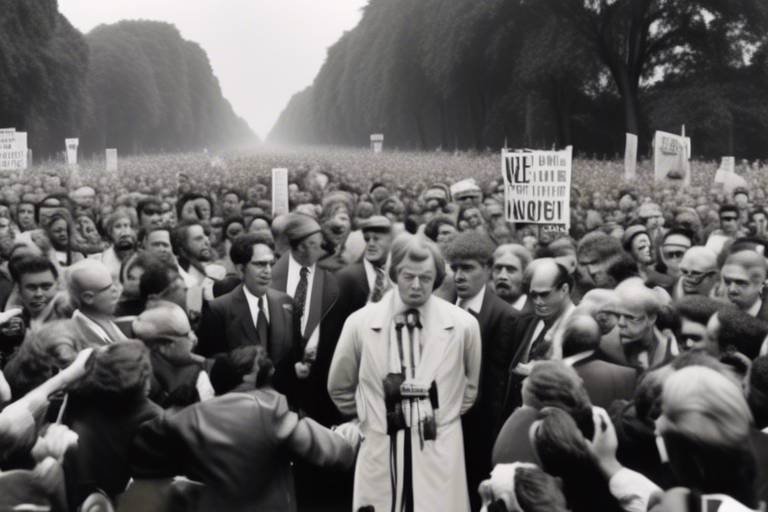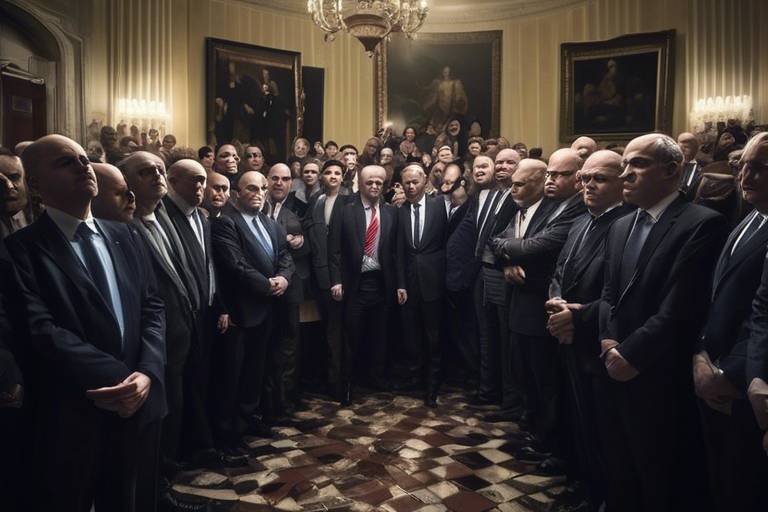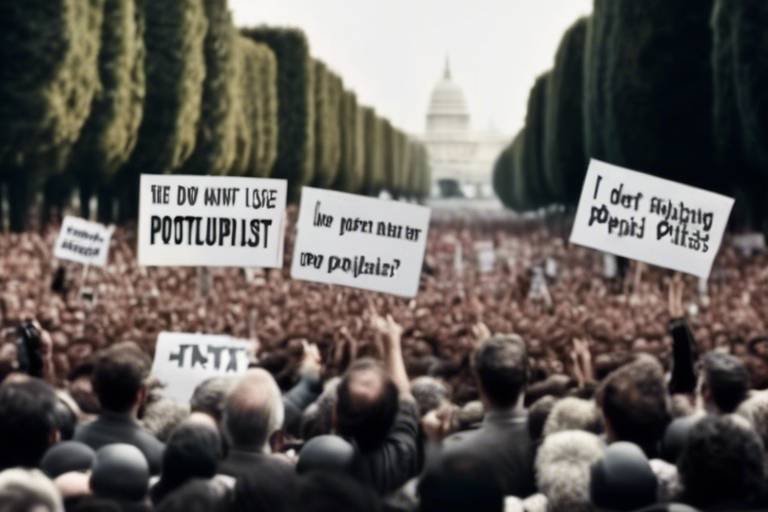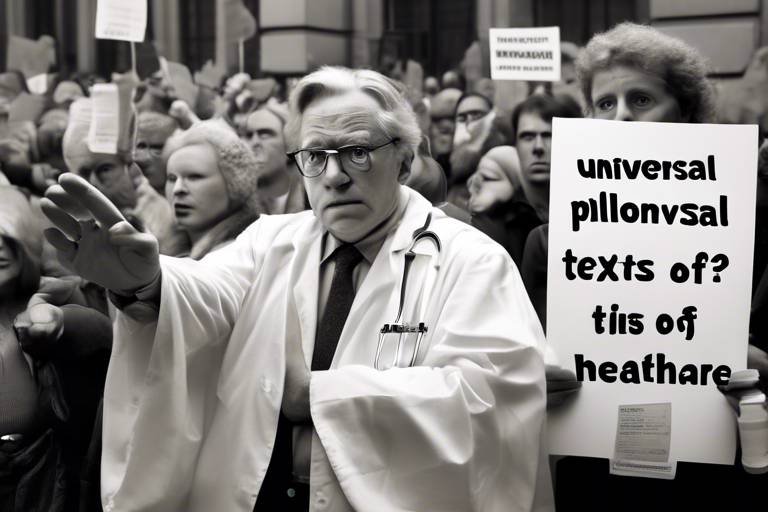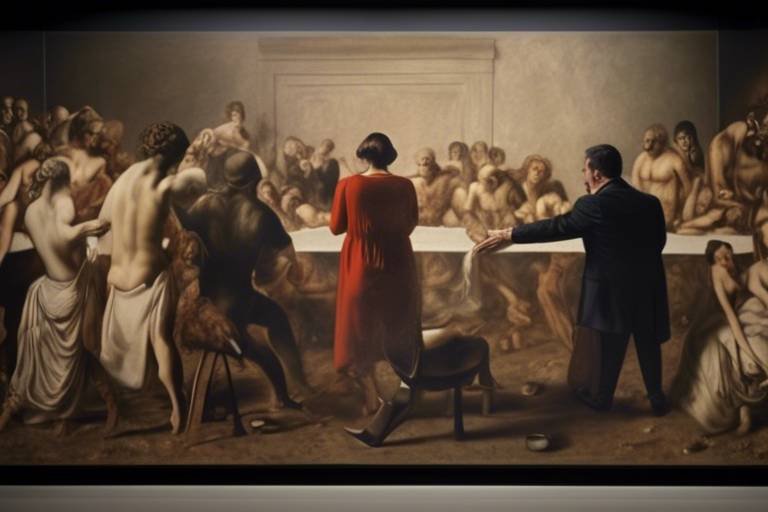The Transformative Power of Political Philosophy
Political philosophy is not just an abstract concept confined to dusty books or academic debates; it is a dynamic force that shapes our societies, influences governance, and inspires movements. Think about it: every law, every government policy, and every social movement is rooted in some philosophical idea. From the ancient Greeks to modern-day thinkers, the evolution of political thought has sparked revolutions, reformed societies, and continues to challenge the status quo. This article delves into how political philosophy serves as a foundation for understanding complex societal structures and the ongoing relevance it holds in contemporary issues.
Imagine walking through a bustling city, where every street corner, every building, and every interaction is a reflection of the political ideologies that govern its inhabitants. This is the power of political philosophy; it’s like the unseen hand that guides the actions of individuals and groups alike. Political philosophy asks the big questions: What is justice? What is the role of government? How do we balance individual freedom with the collective good? These questions are not just theoretical; they have real-world implications that affect our daily lives.
As we explore the rich tapestry of political thought, we will encounter key thinkers whose ideas have left an indelible mark on our understanding of governance and society. From Plato’s vision of an ideal state to Rousseau’s social contract, these philosophical frameworks provide us with the tools to analyze and critique our political systems. They encourage us to reflect on our values and challenge us to envision a better society. Just as a sculptor chisels away at a block of marble to reveal a masterpiece, political philosophy helps us carve out a clearer understanding of our societal goals and aspirations.
In the following sections, we will dive deeper into the origins of political philosophy, examine the contributions of notable thinkers, and analyze how these ideas have inspired social movements throughout history. Whether it's the fight for civil rights or the call for environmental sustainability, political philosophy remains a potent catalyst for change. So, buckle up as we embark on this intellectual journey, exploring the transformative power of political philosophy in shaping not just our past, but also our future.
- What is political philosophy? Political philosophy is the study of fundamental questions about government, justice, rights, and the role of individuals in society.
- Why is political philosophy important? It helps us understand the principles that underpin our political systems and encourages critical thinking about governance and societal values.
- Who are some key figures in political philosophy? Notable thinkers include Plato, Aristotle, Machiavelli, Hobbes, Locke, and Rousseau, each contributing unique perspectives on political thought.
- How does political philosophy influence social movements? Political philosophy provides the ideological foundation for social movements, inspiring individuals to advocate for change based on principles of justice and equality.

The Origins of Political Philosophy
Political philosophy, at its core, is the study of how societies govern themselves and the ethical implications of these systems. It didn't just pop up out of nowhere; it has roots that stretch back to ancient civilizations, where thinkers began to ponder the nature of justice, power, and the role of the individual in society. Imagine a time when human beings were just starting to form communities—this was a pivotal moment that sparked the flame of political thought.
One of the earliest and most influential figures in this realm was Plato, who lived in ancient Greece around 427-347 BCE. His work, particularly in "The Republic," laid the groundwork for much of Western political philosophy. Plato envisioned a society governed by philosopher-kings—wise rulers who would prioritize justice and the common good over personal gain. He believed that education was crucial in shaping these leaders, arguing that only those who truly understood the nature of virtue could lead effectively.
Following in Plato's footsteps was his student, Aristotle, who took a more practical approach to politics. Aristotle, often referred to as the father of political science, emphasized the importance of virtue ethics and civic engagement. He believed that a thriving community relied on active participation from its citizens. In his work "Politics," he explored various forms of governance and the role of the middle class in achieving stability and justice. Aristotle's insights are still relevant today, as they encourage us to think critically about our roles within our own societies.
As we delve deeper into the origins of political philosophy, we can’t overlook the influence of Rousseau, who introduced the concept of the social contract in the 18th century. He argued that legitimate political authority comes from a contract between the governed and the government, emphasizing the collective will of the people. This idea has had profound implications for modern democracy, as it stresses the importance of individual freedom and the necessity of government accountability.
To better understand the evolution of political thought, let's take a look at a brief timeline of key figures and their contributions:
| Philosopher | Era | Key Contribution |
|---|---|---|
| Plato | 427-347 BCE | Philosopher-kings and the concept of justice |
| Aristotle | 384-322 BCE | Virtue ethics and civic engagement |
| Hobbes | 1588-1679 | Social contract theory and the necessity of a strong central authority |
| Locke | 1632-1704 | Natural rights and government by consent |
| Rousseau | 1712-1778 | Collective will and the social contract |
These thinkers didn’t just theorize in a vacuum; their ideas were responses to the political climates of their times. They grappled with fundamental questions: What is justice? What is the role of government? How should power be distributed? These inquiries continue to resonate today, as we face new challenges in governance and society. The origins of political philosophy remind us that the quest for understanding how we live together is as old as civilization itself, and it remains a vital part of our ongoing discourse.
- What is political philosophy? Political philosophy is the study of fundamental questions about government, justice, rights, and the role of individuals in society.
- Who are some key figures in political philosophy? Key figures include Plato, Aristotle, Hobbes, Locke, and Rousseau, each contributing unique perspectives on governance and ethics.
- Why is political philosophy important today? It helps us understand current political systems and inspires movements for social change by providing a framework for justice and equality.

Key Thinkers and Their Contributions
The realm of political philosophy is rich with brilliant minds who have shaped our understanding of governance, power, and society. These thinkers didn’t just theorize; they laid the groundwork for the political structures we navigate today. Each philosopher brought unique perspectives that continue to resonate through the ages, influencing everything from democratic ideals to the nature of authority. Let’s dive into the contributions of some of these pivotal figures and see how their ideas have transformed the political landscape.
Machiavelli is often regarded as the father of modern political science. His seminal work, The Prince, offers a starkly realistic view of power. Unlike his predecessors, who focused on idealism, Machiavelli emphasized the importance of pragmatism in governance. He famously argued that the ends justify the means, a concept that has sparked both admiration and controversy. His ideas encourage leaders to prioritize stability and effectiveness over moral considerations, making his work essential for understanding political strategy today.
Next, we have Thomas Hobbes, whose thoughts on human nature and social contract theory laid the foundation for modern political philosophy. In his book Leviathan, Hobbes described life in a state of nature as "solitary, poor, nasty, brutish, and short." This grim outlook led him to advocate for a powerful sovereign to maintain order and prevent chaos. His ideas about the necessity of a strong central authority continue to be debated in contemporary discussions about governance and individual rights.
On the other end of the spectrum, we find John Locke, who championed the principles of liberty and equality. Locke's theories on natural rights and the social contract significantly influenced the development of democratic thought. He argued that individuals have inherent rights to life, liberty, and property, which governments must protect. His ideas were instrumental in shaping the American and French revolutions, emphasizing the importance of consent and representation in governance.
Then, there’s Jean-Jacques Rousseau, whose concept of the social contract further evolved the discourse on democracy and individual freedom. Rousseau believed that true political authority comes from the collective will of the people, famously stating that "Man is born free, and everywhere he is in chains." His work highlighted the tension between individual desires and the common good, prompting discussions about civic responsibility and the role of citizens in shaping their governments.
To summarize the contributions of these key thinkers, let’s take a look at the following table:
| Philosopher | Key Contribution | Major Work |
|---|---|---|
| Machiavelli | Realism in politics; the importance of pragmatism | The Prince |
| Hobbes | The necessity of a strong sovereign; social contract theory | Leviathan |
| Locke | Natural rights; government by consent | Two Treatises of Government |
| Rousseau | Collective will; tension between individual freedom and the common good | The Social Contract |
Each of these thinkers has left an indelible mark on political philosophy, offering insights that challenge and inspire. Their ideas have sparked revolutions, shaped governments, and influenced countless movements around the globe. Understanding their contributions not only enriches our comprehension of political theory but also equips us to engage more thoughtfully in contemporary political discourse.
- What is the main idea behind Machiavelli’s philosophy? Machiavelli emphasizes the importance of pragmatism in politics, suggesting that leaders must sometimes act immorally to maintain stability and power.
- How did Hobbes view human nature? Hobbes had a rather pessimistic view, believing that humans are inherently self-interested and that a strong authority is necessary to prevent chaos.
- What are Locke’s natural rights? Locke argued that individuals are entitled to life, liberty, and property, and that governments are created to protect these rights.
- What does Rousseau mean by the 'collective will'? Rousseau’s concept of the collective will refers to the idea that true political authority arises from the general will of the people, emphasizing democratic governance.

Plato's Ideal State
When we think about the concept of an ideal society, Plato often springs to mind. His vision, laid out in the dialogues of the Republic, presents a world governed by philosopher-kings—wise rulers who possess not only knowledge but also a deep understanding of justice. Imagine a city where the leaders are not just politicians, but thinkers who prioritize the welfare of their citizens above all else. This is the essence of Plato's ideal state.
At the heart of Plato's philosophy is the belief that justice is the highest virtue, both in the individual and in society. He argues that for a state to be truly just, its rulers must be educated in the philosophical principles that govern human behavior and ethics. Plato famously uses the Allegory of the Cave to illustrate how most people are trapped in ignorance, only seeing shadows of reality. A philosopher-king, having emerged from the cave and seen the true light of knowledge, can lead the state toward enlightenment and harmony.
In Plato's vision, the ideal state is structured into three distinct classes:
- Rulers: The philosopher-kings who govern with wisdom.
- Guardians: The warriors who protect the state and uphold its laws.
- Producers: The farmers, artisans, and merchants who provide for the material needs of society.
This tripartite structure is crucial for maintaining balance and order. Plato argues that each class has its own role and responsibilities, and when each fulfills its duty, the state thrives. The rulers must be wise, the guardians brave, and the producers skilled. This division of labor not only promotes efficiency but also ensures that the state functions harmoniously.
Furthermore, education plays a pivotal role in Plato's ideal state. He believed that individuals must undergo rigorous training to develop their intellectual and moral capacities. The education system he proposed was designed to identify and nurture potential philosopher-kings from a young age, ensuring that only those with the highest capabilities would ascend to leadership roles. This emphasis on education reflects Plato's conviction that a well-informed populace is essential for the health of any society.
In conclusion, Plato's ideal state is not merely a theoretical construct; it serves as a profound commentary on governance, ethics, and the human condition. His ideas challenge us to reflect on the qualities we value in our leaders and the structures we create to support a just society. As we navigate the complexities of modern governance, Plato's insights remain strikingly relevant, reminding us that true leadership requires wisdom, virtue, and a commitment to the common good.
- What is Plato's ideal state? Plato's ideal state is a society governed by philosopher-kings who prioritize justice and the common good, structured into three classes: rulers, guardians, and producers.
- Why does Plato emphasize education? Plato believes that education is essential for developing the wisdom and moral character necessary for effective leadership and a just society.
- How does the Allegory of the Cave relate to his political philosophy? The Allegory of the Cave illustrates the difference between ignorance and enlightenment, emphasizing the need for knowledgeable rulers who can lead society out of darkness.

Aristotle's Practical Politics
When we think about politics, it’s easy to get lost in the complexities of governance, laws, and policies. But Aristotle, one of the greatest minds of ancient Greece, brought a refreshing perspective that focuses on the very essence of what it means to live well together as a community. In his seminal work, Politics, Aristotle emphasizes the importance of virtue ethics and the role of the citizen in a thriving society. He believed that politics is not merely about ruling or being ruled; it’s about achieving the good life—a concept that still resonates today.
Aristotle argued that the best political system is one that promotes the common good rather than the interests of a select few. He categorized governments into three ideal forms: monarchy, aristocracy, and polity, each corresponding to a perverse form: tyranny, oligarchy, and democracy. What’s fascinating is how he didn’t dismiss democracy outright; instead, he advocated for a balanced approach where citizens actively participate in decision-making processes. This is a stark reminder that democracy thrives when citizens are engaged and informed.
One of Aristotle’s key contributions is the idea of civic engagement. He posited that individuals should not only be aware of their rights but also their responsibilities as members of the community. This idea encourages us to think critically about our roles in society. Are we merely passive observers, or are we actively shaping our political landscape? Aristotle would argue that true fulfillment comes from participating in the political process, thereby cultivating a sense of belonging and responsibility.
Moreover, Aristotle’s notion of virtue ethics plays a crucial role in his political theory. He believed that a virtuous citizen is essential for a healthy political community. Virtue, according to Aristotle, is about finding the balance between extremes—what he called the Golden Mean. For instance, courage is the mean between recklessness and cowardice. This principle can be applied not only to individual behavior but also to governance. A government that embodies virtues like justice, wisdom, and temperance is more likely to foster a harmonious society.
In today’s world, where political polarization seems to be the norm, Aristotle’s emphasis on the middle ground is more relevant than ever. By advocating for dialogue and understanding among diverse viewpoints, we can work towards a political environment that values cooperation over conflict. Aristotle’s insights remind us that effective politics is not just about winning debates but about fostering a community where everyone’s voice matters.
To summarize, Aristotle’s practical politics offers a framework that encourages active participation, emphasizes virtue, and seeks the common good. His teachings challenge us to reflect on our roles as citizens and inspire us to strive for a political landscape that nurtures our collective well-being.
- What is Aristotle's view on democracy?
Aristotle saw democracy as a valid form of government but emphasized the need for active citizen engagement to ensure it serves the common good. - How does Aristotle define virtue in politics?
Virtue, for Aristotle, is about finding balance; a virtuous citizen contributes to a healthy political community by embodying qualities like justice and wisdom. - Why is civic engagement important according to Aristotle?
Civic engagement is crucial because it empowers citizens to take responsibility for their community, fostering a sense of belonging and promoting the common good.

Rousseau and the Social Contract
Jean-Jacques Rousseau, a towering figure in political philosophy, introduced the concept of the social contract in his seminal work, "The Social Contract," published in 1762. His ideas were revolutionary, challenging the established norms of governance and proposing a new vision of political organization that emphasized the importance of the collective will of the people. Rousseau believed that in order to achieve true freedom, individuals must come together to form a collective body politic, which he referred to as the "general will." This concept suggests that the will of the majority should guide the actions of the state, ensuring that laws reflect the common interests of all citizens.
Rousseau argued that civilization, while advancing human progress, also corrupted natural goodness and created inequalities. He famously stated, "Man is born free, and everywhere he is in chains." This poignant assertion highlights his belief that societal structures often inhibit individual freedom. In his view, the social contract serves as a means to escape these chains by establishing a society where individuals willingly submit to the general will in exchange for the protection of their rights and freedoms. The essence of this contract is that individuals do not just give up their rights; rather, they gain the right to participate in the formation of laws that govern them.
One of the most striking aspects of Rousseau's theory is the idea that legitimate political authority arises not from divine right or coercion but from the consent of the governed. This notion laid the groundwork for modern democratic thought and continues to resonate in contemporary discussions about governance and individual rights. Rousseau's social contract emphasizes that true sovereignty lies with the people, and any government that fails to reflect the general will is illegitimate.
To further understand Rousseau's contributions, let's break down the key elements of the social contract:
- Collective Will: The general will is the collective interest of the people, transcending individual desires.
- Legitimacy of Authority: Governments derive their authority from the consent of the governed.
- Freedom and Equality: The social contract aims to protect individual freedoms while promoting equality among citizens.
Rousseau's ideas on the social contract have had a profound impact on various political movements and ideologies, inspiring revolutions and the development of democratic systems worldwide. His emphasis on equality and collective decision-making continues to influence contemporary debates about governance, social justice, and the role of citizens in shaping their societies. In a world increasingly defined by individualism, Rousseau's call for unity and collective action serves as a reminder of the power of community in achieving a just society.
1. What is Rousseau's main idea about the social contract?
Rousseau's main idea is that legitimate political authority arises from the consent of the governed, and individuals must come together to form a collective will that guides the state.
2. How does Rousseau define the general will?
The general will is the collective interest of the people, representing the common good that transcends individual desires and aspirations.
3. What impact did Rousseau's ideas have on modern democracy?
Rousseau's ideas laid the groundwork for modern democratic thought by emphasizing the importance of equality, freedom, and the role of citizens in shaping their governance.
4. Why did Rousseau believe civilization corrupted natural goodness?
Rousseau believed that while civilization advanced human progress, it also created inequalities and inhibited individual freedom, leading to moral corruption.

Modern Political Philosophy
The landscape of modern political philosophy is as dynamic and multifaceted as the societies it seeks to understand and improve. Emerging from the shadows of the Enlightenment, modern political thought has evolved to address the complex realities of contemporary governance, human rights, and social justice. Thinkers such as John Stuart Mill, Karl Marx, and John Rawls have each contributed unique perspectives that continue to resonate in today's discussions about power, equality, and freedom.
At the heart of modern political philosophy is the struggle for individual rights and the role of the state in protecting those rights. For instance, John Stuart Mill championed the idea of **liberalism**, arguing for individual freedom as a fundamental component of a just society. His work, On Liberty, emphasizes the importance of personal autonomy and the dangers of societal tyranny. Mill's ideas laid the groundwork for contemporary discussions around **civil liberties** and **human rights**, influencing movements that advocate for marginalized groups.
Meanwhile, Karl Marx introduced a revolutionary critique of capitalism, focusing on the inherent inequalities it produces. His vision of a classless society challenges the status quo and inspires countless movements advocating for social and economic justice. Marx's analysis of class struggle remains relevant today, particularly in discussions about wealth distribution and the growing disparity between the rich and the poor. In this light, modern political philosophy often grapples with the tension between individual rights and collective responsibility, questioning how best to balance these sometimes conflicting ideals.
Another pivotal figure in modern political thought is John Rawls, whose theory of justice seeks to establish a framework for fairness in society. In his seminal work, A Theory of Justice, Rawls proposes the concept of the **original position** and the **veil of ignorance** as a method for determining the principles of justice. By imagining a society where individuals do not know their social status, Rawls argues for policies that ensure fair opportunities and protect the most disadvantaged. This approach has profoundly influenced contemporary debates on social justice and has provided a philosophical foundation for policies aimed at reducing inequality.
In addition to these foundational thinkers, modern political philosophy also engages with pressing global issues such as **globalization**, **environmental ethics**, and **multiculturalism**. The rise of global interconnectivity challenges traditional notions of sovereignty and prompts questions about the responsibilities of states toward one another and the planet. As we face climate change and its far-reaching consequences, the intersection of political philosophy and environmental ethics becomes increasingly critical. Philosophers like Peter Singer advocate for a utilitarian approach to environmental issues, emphasizing our moral obligation to future generations and non-human entities.
In summary, modern political philosophy is not just a relic of academic inquiry; it is a vibrant field that actively engages with the challenges of our time. By examining the contributions of key thinkers and their relevance to contemporary issues, we can better understand the forces shaping our world. The ongoing dialogue within this discipline encourages us to reflect on our values and the kind of society we wish to create, making it an essential aspect of our collective journey toward a more just and equitable future.
- What is modern political philosophy?
Modern political philosophy refers to the body of thought that addresses contemporary issues of governance, rights, and justice, building on the foundations laid by earlier philosophers. - Who are the key figures in modern political philosophy?
Key figures include John Stuart Mill, Karl Marx, and John Rawls, each contributing distinct perspectives on liberty, equality, and justice. - How does modern political philosophy relate to social movements?
Modern political philosophy provides the theoretical underpinnings for many social movements, advocating for rights and equality, and inspiring collective action. - What role does environmental ethics play in political philosophy?
Environmental ethics within political philosophy addresses the moral implications of our actions on the environment and advocates for sustainable policies to protect future generations.

The Role of Political Philosophy in Social Movements
Political philosophy is more than just a collection of theories; it's a powerful catalyst for social change. Throughout history, it has inspired countless movements that have reshaped societies and redefined the concept of justice. Think about it: when people come together to fight for a cause, they're often rallying around philosophical ideas that resonate deeply within them. These ideas provide a framework for understanding their grievances and aspirations. Political philosophy gives voice to the voiceless and serves as a compass guiding movements toward their goals.
Consider the civil rights movement in the United States. At its core, it was fueled by the philosophical principles of equality and justice. Thinkers like John Locke, who emphasized natural rights, and Thomas Jefferson, who echoed those sentiments in the Declaration of Independence, laid the groundwork for the assertion that all men are created equal. Activists such as Martin Luther King Jr. drew upon these ideas, articulating a vision of a just society where racial discrimination would be a relic of the past. His famous "I Have a Dream" speech wasn't just a call to action; it was a philosophical manifesto that challenged the moral fabric of society.
Moreover, political philosophy also plays a crucial role in contemporary movements, such as environmental activism. As the world grapples with climate change, philosophers like Arne Naess have championed the idea of deep ecology, which argues for the intrinsic value of all living beings, not just humans. This perspective shifts the conversation from one of human-centered policy to a more holistic approach that considers the health of the planet as a moral imperative. In this way, political philosophy not only informs activism but also enriches it, providing ethical frameworks that advocate for sustainability and responsible governance.
The intersection of political philosophy and social movements reveals a dynamic relationship. Movements are often born out of a philosophical critique of the status quo, and in turn, they can inspire new philosophical discourse. For example, the feminist movement has challenged traditional notions of gender roles, prompting philosophers to re-examine concepts of power, identity, and freedom. This reciprocal influence highlights the importance of political philosophy in shaping not just the movements themselves but also the broader societal context in which they operate.
In summary, political philosophy is a vital force in social movements. It offers a lens through which people can understand their struggles and aspirations, providing the language and framework necessary for collective action. Whether through the lens of civil rights, environmental ethics, or other social justice causes, the ideas born from political philosophy continue to resonate and inspire. They remind us that the quest for justice is not just a political endeavor but a deeply philosophical one, rooted in our shared humanity and the ideals we strive to uphold.
- What is the role of political philosophy in social movements?
Political philosophy provides the foundational ideas and ethical frameworks that inspire and guide social movements. It helps articulate grievances and aspirations, allowing people to unite around shared ideals.
- Can you give an example of a social movement influenced by political philosophy?
The civil rights movement in the United States is a prime example, drawing on the philosophical principles of equality and justice articulated by thinkers like John Locke and Thomas Jefferson.
- How does political philosophy relate to environmental activism?
Political philosophy informs environmental activism by providing ethical frameworks, such as deep ecology, that advocate for the intrinsic value of all living beings and the importance of sustainable governance.

Philosophy and Civil Rights
The intersection of philosophy and civil rights is a profound realm that has shaped the very fabric of our societies. At its core, civil rights are about the fundamental freedoms and protections that every individual deserves, regardless of their background. Philosophers have long grappled with the ideas of equality, justice, and human dignity, laying the groundwork for movements that seek to uphold these principles. Think about it: without the philosophical underpinnings advocating for equality, would we have seen the emergence of powerful movements like the civil rights movement in the United States or the anti-apartheid struggle in South Africa?
One of the most significant philosophical contributions to civil rights comes from the concept of natural rights. This idea, championed by thinkers such as John Locke, posits that individuals are entitled to certain rights simply by virtue of being human. These rights include life, liberty, and property, and they form the cornerstone of many democratic societies. Locke’s assertion that governments are established to protect these rights has inspired countless activists to demand justice and equality. Imagine a world where these rights are universally acknowledged; it would be a world where oppression has no place.
Moreover, the philosophical discourse surrounding equality has been pivotal in civil rights movements. The notion that all individuals should be treated equally, regardless of race, gender, or socioeconomic status, has roots in the works of philosophers like Immanuel Kant, who argued that all humans possess inherent worth. This idea has fueled the flames of activism, as people rally around the belief that everyone deserves a fair chance at life. The famous phrase "all men are created equal," originating from the Declaration of Independence, echoes this sentiment and serves as a rallying cry for those fighting against injustice.
Additionally, the philosophical exploration of justice has provided a framework for understanding and addressing systemic inequities. Thinkers like John Rawls introduced the concept of the "veil of ignorance," which encourages us to consider fairness from a position where we do not know our own social status. This thought experiment compels us to create policies that benefit all members of society, especially the most vulnerable. It’s a powerful reminder that true justice cannot be achieved unless we consider the needs of everyone, not just the privileged few.
In practice, the philosophical foundations of civil rights have led to significant legislative changes and societal shifts. For instance, the Civil Rights Act of 1964 in the United States was not just a legal document; it was a manifestation of years of philosophical debate about equality and justice. Activists like Martin Luther King Jr. drew heavily from philosophical principles, advocating for nonviolent resistance and the moral imperative to fight against injustice. His famous "I Have a Dream" speech is a testament to how philosophical ideas can inspire hope and mobilize entire communities.
Furthermore, the ongoing struggle for civil rights today is still deeply rooted in philosophical thought. Issues such as gender equality, LGBTQ+ rights, and racial justice continue to be informed by the same principles that guided past movements. As we navigate the complexities of modern society, the philosophical discourse surrounding civil rights remains relevant, urging us to reflect on our values and commitments to justice.
In conclusion, the relationship between philosophy and civil rights is not merely academic; it is a living, breathing dialogue that continues to shape our world. By understanding the philosophical foundations that underpin civil rights movements, we can better appreciate the struggles and triumphs of those who have fought for equality and justice. As we move forward, let us remember that philosophy is not just for scholars; it is a powerful tool for change, urging us to envision a world where every individual is recognized and respected.
- What is the role of philosophy in civil rights movements? Philosophy provides the foundational ideas of equality, justice, and human dignity that inspire and guide civil rights activism.
- How have philosophers influenced modern civil rights? Philosophers like Locke and Kant have shaped our understanding of natural rights and equality, which are central to contemporary civil rights discussions.
- Why is understanding philosophy important for social change? Understanding philosophical principles allows activists to articulate their goals clearly and draw upon a rich tradition of thought that supports their cause.

Environmental Ethics and Political Thought
In our rapidly changing world, the intersection of environmental ethics and political thought has never been more crucial. As we face pressing issues like climate change, deforestation, and biodiversity loss, the philosophical underpinnings of our political systems are being scrutinized and reshaped. Environmental ethics compels us to consider not just human welfare but also the well-being of the planet and all its inhabitants. It raises a fundamental question: What responsibilities do we have towards the environment?
Political philosophers have begun to address this question, arguing that our ethical obligations extend beyond our immediate communities. Thinkers like John Rawls and Alasdair MacIntyre have contributed to the discourse by integrating environmental concerns into their frameworks of justice and virtue ethics, respectively. They emphasize that a just society must consider the long-term health of our ecosystems, as failing to do so threatens not only future generations but also the very fabric of our societies.
Moreover, the concept of intergenerational justice emerges as a vital component of environmental political philosophy. This idea posits that we owe it to future generations to maintain the planet's resources and ecosystems. It challenges us to think critically about our consumption patterns and the sustainability of our lifestyles. Are we living in a way that honors the needs of those who will come after us? This ethical consideration is crucial as we navigate policies that impact the environment.
To further illustrate the importance of these ideas, consider the following table that outlines key environmental ethical theories and their political implications:
| Ethical Theory | Key Proponents | Political Implications |
|---|---|---|
| Deep Ecology | Arne Naess | Advocates for intrinsic value of nature; promotes radical changes in policy to protect ecosystems. |
| Ecofeminism | Carolyn Merchant | Links the exploitation of women and nature; calls for a restructuring of societal values. |
| Sustainable Development | Gro Harlem Brundtland | Emphasizes balancing economic growth with environmental protection; influences global policy frameworks. |
The relevance of political philosophy in environmental ethics also manifests through social movements. Activists draw upon philosophical concepts to advocate for policies that prioritize sustainability and ecological justice. For instance, the Green New Deal in the United States is a political initiative that embodies these principles, aiming to address climate change while also promoting social equity. It's a powerful example of how philosophical thought can inspire tangible political action.
In conclusion, the dialogue between environmental ethics and political philosophy is not just an academic exercise; it is a vital conversation that shapes our collective future. As we confront the realities of environmental degradation, the philosophical frameworks we embrace will determine the effectiveness of our responses. Are we prepared to rethink our political structures and ethical commitments to protect the planet? The answer to this question will define the legacy we leave behind.
- What is environmental ethics? Environmental ethics is a branch of philosophy that examines the moral relationship between humans and the natural environment, advocating for the intrinsic value of nature.
- How does political philosophy relate to environmental issues? Political philosophy provides the frameworks and principles that guide political action and policy-making regarding environmental protection and sustainability.
- Why is intergenerational justice important? Intergenerational justice emphasizes our responsibilities to future generations, urging us to consider the long-term impacts of our actions on the environment.
- What role do social movements play in environmental ethics? Social movements leverage philosophical ideas to mobilize communities and advocate for policies that prioritize ecological sustainability and social justice.
Frequently Asked Questions
- What is political philosophy?
Political philosophy is the study of fundamental questions about the state, government, politics, liberty, justice, and the enforcement of a legal code by authority. It explores concepts such as rights, freedom, and the moral basis of political systems.
- Who are some key figures in political philosophy?
Some of the most influential figures include Plato, Aristotle, Machiavelli, Thomas Hobbes, John Locke, and Jean-Jacques Rousseau. Each of these thinkers has contributed unique ideas that have shaped political thought and practice throughout history.
- How did political philosophy originate?
Political philosophy originated in ancient civilizations, particularly in Greece, where thinkers like Plato and Aristotle laid the groundwork for discussing governance and ethics. Their ideas have continued to resonate through the ages, influencing modern political discourse.
- What is the significance of Plato's ideal state?
Plato's ideal state emphasizes the role of philosopher-kings who govern based on wisdom and justice. His vision highlights the importance of education and virtue in creating a harmonious society, which remains a topic of discussion in contemporary political thought.
- What does Aristotle contribute to political philosophy?
Aristotle introduced the concept of virtue ethics and practical politics, focusing on civic engagement and the role of citizens in governance. He believed that a thriving community relies on the active participation of its members in political life.
- What is Rousseau's theory of the social contract?
Rousseau's theory of the social contract posits that individuals come together to form a collective will, which is essential for democracy and individual freedom. His ideas challenge traditional notions of authority and promote the idea of popular sovereignty.
- How does political philosophy relate to social movements?
Political philosophy has played a crucial role in inspiring social movements by providing a framework for understanding justice, equality, and rights. Philosophical concepts often mobilize individuals and unify them around shared ideals, driving social change.
- What is the connection between political philosophy and civil rights?
Philosophical foundations of civil rights movements are rooted in ideas of equality and justice. Thinkers like Locke and Rousseau have influenced advocates for human rights, emphasizing the moral imperative to fight against oppression and inequality.
- How does political philosophy address environmental issues?
Political philosophy intersects with environmental ethics by examining the moral responsibilities of individuals and governments towards the environment. It advocates for sustainability and responsible governance, especially in the context of climate change and ecological crises.

